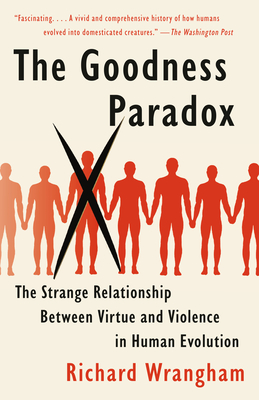

 Vintage
Vintage
The Goodness Paradox: The Strange Relationship Between Virtue and Violence in Human Evolution


Key Metrics
- Richard Wrangham
- Vintage
- Paperback
- 9781101970195
- 7.9 X 5.1 X 1 inches
- 0.8 pounds
- Science > Life Sciences - Biology
- English
 Secure Transaction
Secure TransactionBook Description
--Steven Pinker, author of The Better Angels of Our Nature
We Homo sapiens can be the nicest of species and also the nastiest. What occurred during human evolution to account for this paradox? What are the two kinds of aggression that primates are prone to, and why did each evolve separately? How does the intensity of violence among humans compare with the aggressive behavior of other primates? How did humans domesticate themselves? And how were the acquisition of language and the practice of capital punishment determining factors in the rise of culture and civilization?
Authoritative, provocative, and engaging, The Goodness Paradox offers a startlingly original theory of how, in the last 250 million years, humankind became an increasingly peaceful species in daily interactions even as its capacity for coolly planned and devastating violence remains undiminished. In tracing the evolutionary histories of reactive and proactive aggression, biological anthropologist Richard Wrangham forcefully and persuasively argues for the necessity of social tolerance and the control of savage divisiveness still haunting us today.
Author Bio
Richard Wrangham (PhD, Cambridge University, 1975) is Ruth B. Moore Professor of Biological Anthropology at Harvard University and founded the Kibale Chimpanzee Project in 1987. He has conducted extensive research on primate ecology, nutrition, and social behavior.
He is best known for his work on the evolution of human warfare, described in the book Demonic Males, and on the role of cooking in human evolution, described in the book Catching Fire: How Cooking Made Us Human. Together with Elizabeth Ross, he co-founded the Kasiisi Project in 1997, and serves as a patron of the Great Apes Survival Partnership (GRASP).
Source: Harvard University - Department of Human Evolutionary Biology
Videos










Community reviews
Write a ReviewNo Community reviews